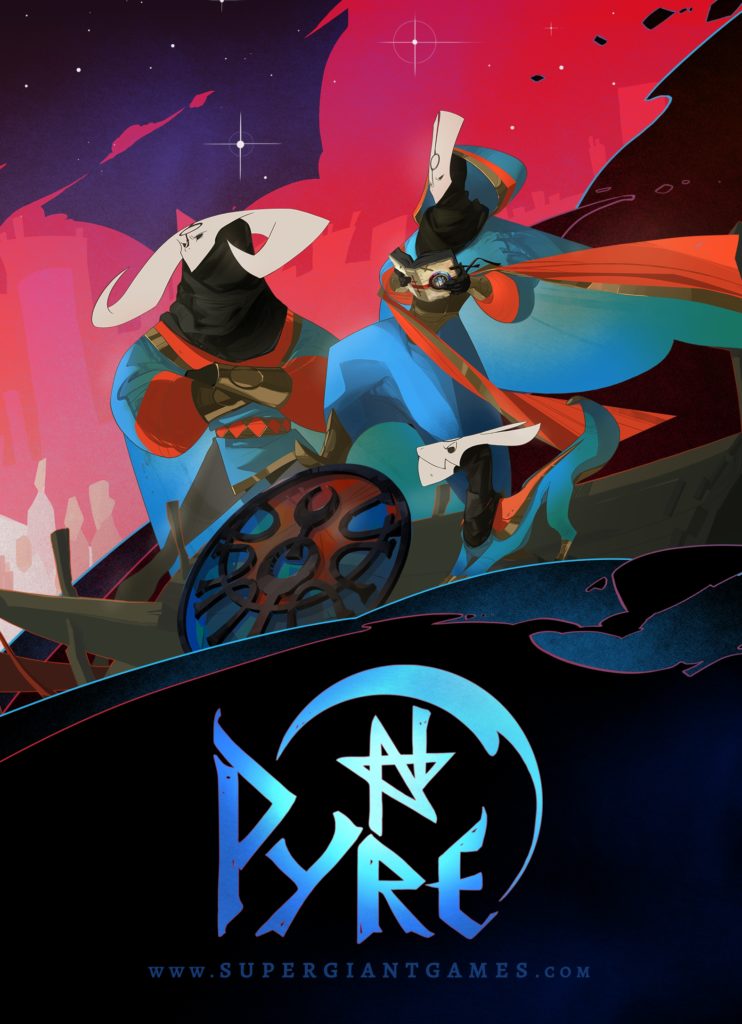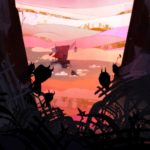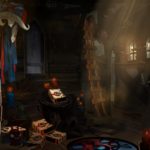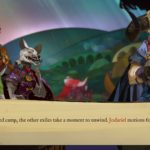
May 8, 2016 at 12:30 p.m.
Greg Kasavin is a lead writer at Supergiant Games. Following a stint at EA Los Angeles, he joined the successful partnership that has created popular indie games, Bastion and Transitor. Supergiant game devs are currently working their newest offering, Pyre. According to their tagline Pyre is, “a party-based RPG in which you lead a band of exiles to freedom through an ancient competition spread across a vast, mystical purgatory.” We caught up with Greg for a few quick questions about his own journey into game development as well as what we can expect from the upcoming indie game release.
Interview with Pyre’s writer Greg Kasavin
Greg, thank you for taking the time to talk to the Slickster Magazine about Pyre. When you are writing the characters and stories for this game, do you ever reference your time spent in the Soviet Republic as a child?
Thank you in turn, and that’s a very interesting question! I was just two-and-a-half when my family left the Soviet Union so I was too little then to remember it now. However, I do think my experience as a U.S. immigrant has had a big effect on my point of view, and must have influenced the kinds of stories I’m interested in writing.
Every one of the games I’ve worked on at Supergiant, including the game we just announced, focuses on characters whose sense of home has been disrupted due to circumstances beyond their control. These stories are also concerned with different cultures and how they interact and intersect. I’m inherently interested in different perspectives — understanding perspectives I don’t necessarily agree with, and how the truth of a matter can seem very different depending on one’s point of view. No matter how much I explore such topics in the games and stories I work on, I find this type of idea to be endlessly fascinating. Maybe that’s a lot to do with my upbringing, and always having been caught between different cultures myself.
Pyre is the third major effort from Supergiant Games. Can you take me through some mistakes or areas you guys wish you would have improved on Transistor and Bastion? And how have you tried to improve on those mistakes with Pyre?
We don’t begin working on our games from a place of trying to improve on any past mistakes. Our first game is all about the need to be able to move past such things…! Besides, we feel very fortunate to have made two successful, well-loved games. Rather than attempt to improve on our previous games, we’ve always endeavored to make something new, that can assert its own identity and live up to our past work.
At the same time, we are always learning, and always trying to improve our development process. We want to be able to keep making games as a team for a long time to come. We want everyone on the team to be spending the most time doing work they find creatively fulfilling. At the same time, we want every individual’s contributions to feel like it’s contributing to a single, cohesive whole. That makes for a very interesting challenge with each new game we make.
We want to keep things fresh for ourselves. So, in some respects each of our games is a response to our previous work. Transistor was a game about a specific character in a specific moment in her life. Pyre is about a larger cast of characters during a much longer period in their lives. We don’t wonder whether one concept is inherently better than the other. We just want to keep pushing ourselves creatively and keep coming up with interesting, worthwhile stuff.
At Slickster Magazine we have been covering the indie game seeing for awhile now, and we are getting flooded with more and more requests from indie game developers. Would you say that the indie game development community is getting overcrowded? Also, could this be the precursor to another “video game crash of 1983” if we don’t start doing some quality control on video game content?
I think this is an incredible time for games. While making good games is very difficult, I have to believe it’s never been easier due to the availability of powerful, free tools and popular digital distribution platforms. I love looking at the top sellers on Steam each week and seeing what surprises show up on there. The sheer variety of types of games being made today is just amazing.
I think the positive aspects of all this far outweigh the negative aspects. Yes, it does mean that many developers have to work harder than ever for their games to get noticed. For publications such as yours, it must be frustrating at times to have to pick and choose, or just weed out all the stuff that you don’t think is a good fit for your audience. On the other hand, I think the best games still often tend to rise to the top, and I’m glad more people than ever before have the opportunity to at least try to make something of value.
I’m not aware of any strong evidence to support the idea of a crash like in ’83. I think more people are spending more time and more money on games now than ever before. There are also more games being made, so unfortunately all the hard work doesn’t always pay off. But I think for all the game players out there, this is a really great time. There are so many games I always want to play!
Many of our readers are aspiring video game designers and developers. What fundamental advice would you offer to someone, maybe in their late teens, who was looking to get into video game design?
It seems to me that everyone’s path into the game industry is very different, so not only is there no formula to follow but it’s also difficult to give any meaningful advice.
If I could go back in time and talk to a younger version of myself, I would encourage him to start making games immediately rather than waiting for something to happen or my circumstances to improve. I tried teaching myself programming on a number of occasions but always struggled and became discouraged. Things turned out all right for me eventually anyway but I think I could have gotten into game development much sooner had I just pushed through more of the hard parts, or found other ways to apply my interest in it. These days there are tools ranging from Unity and Unreal to Game Maker and Twine, all with robust communities around them, so there’s really not much other than time and your own sense of your limitations to stop you from making games.
Making games is very time-consuming and often frustrating. If you’re just getting started, chances are you have another job or schoolwork, or both, to also deal with. Making time for game development in such a way that it doesn’t cause the rest of your life to fall apart can be about as difficult as the game-making itself. But it all can come through practice and discipline. What works for me is to set aside time and stick to a schedule as much as possible. Even if I’m tired or want to do something else I just try and push through and do the work. You can’t count on being inspired or motivated all the time, but the work doesn’t go away, and the truth is game development isn’t always fun. But it can be incredibly rewarding if you can stick with it.
Greg, on behalf of Slickster magazine thanks for taking the time to talk with us about Pyre again. Please tell everyone at Supergiant games that they’re doing a great job and we’re looking forward to the upcoming release of Pyre. Any last shout outs, and where/when can people purchase the game?
Thanks again, and it’s my pleasure! Pyre is currently in full production and should be available sometime next year on Steam and PlayStation 4. We’ve got a lot of work ahead though this is one of the most productive times for us during development, so we’re all looking forward to making this game live up to the potential that so many folks out there see in it.
I do want to give a shout out to all my colleagues at Supergiant: Amir, Gavin, Jen, Andrew, Darren, Josh, Camilo, Michael, Morgan, Logan, JP, and Vivian, you people are awesome, and I feel very lucky to be a part of such a talented team. I’m also grateful to everyone out there who’s taken the time to play through our games. We just wouldn’t be here if people like you weren’t willing to take a chance on us, and we hope to keep surprising and impressing you for a long time to come.







